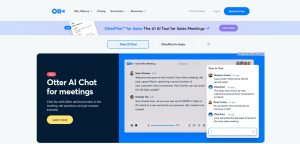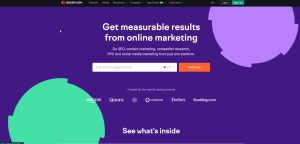Table of Contents
ToggleWhy 15K+ Choose All-in-One Agile CRM?
In today’s dynamic and increasingly competitive business environment, successfully managing customer relationships is more than just a best practice – it is fundamentally essential for driving sustainable growth and ensuring long-term survival. Businesses of virtually every size and industry often find themselves struggling with the complex task of overseeing various customer-facing processes simultaneously. This includes meticulously managing sales pipelines, diligently nurturing leads through targeted marketing campaigns, and consistently delivering exceptional customer service experiences. The common challenge arises when businesses rely on a patchwork of separate, isolated tools to handle these distinct functions. This fragmented approach frequently leads to significant data silos, where crucial information is trapped within individual systems and cannot be easily shared or accessed across departments. The result is often inefficiency, missed opportunities, and a disjointed, frustrating experience not only for the employees attempting to use these disparate systems but also for the customers who interact with different parts of the business.
Imagine a different scenario. What if there existed a single, unified software platform specifically designed to bring together all of these critical customer engagement functions? A system purposefully built to streamline internal operations, significantly enhance cross-departmental collaboration, and provide a truly unified, 360-degree view of every single customer interaction from the very first touchpoint to ongoing support and beyond? This is the powerful promise held by an all-in-one CRM solution.
This is where Agile CRM enters the picture. Positioning itself as a “next-generation” platform, Agile CRM aims to consolidate and unify core sales, marketing, and service activities into one robust, yet intentionally simple-to-use, cloud-based system. Its ambition is to serve as the central nervous system for customer interactions within a business. However, in a marketplace crowded with countless CRM options, each claiming unique benefits, does Agile CRM genuinely fulfill its ambitious all-in-one promise as we look at the landscape in 2024? Is it the transformative game-changer your business has potentially been searching for, or could it merely be another tool that inadvertently adds to existing operational complexity?
This in-depth review is designed to take a comprehensive look at Agile CRM, specifically examining its capabilities and positioning for the year 2024. We will thoroughly explore its core features across sales, marketing, and service, rigorously evaluate its ease of use and technical performance, meticulously break down its pricing structure and the overall value it offers (including its notably generous free plan), and provide a balanced assessment of its key advantages and potential disadvantages. By the time you finish reading this article, you should have a clear and informed perspective on whether Agile CRM is the appropriate fit to help supercharge your business operations, build stronger customer relationships, and drive efficiency in the current business climate.
Introduction: What is Agile CRM and Why is it Trusted by 15,000+ Customers?
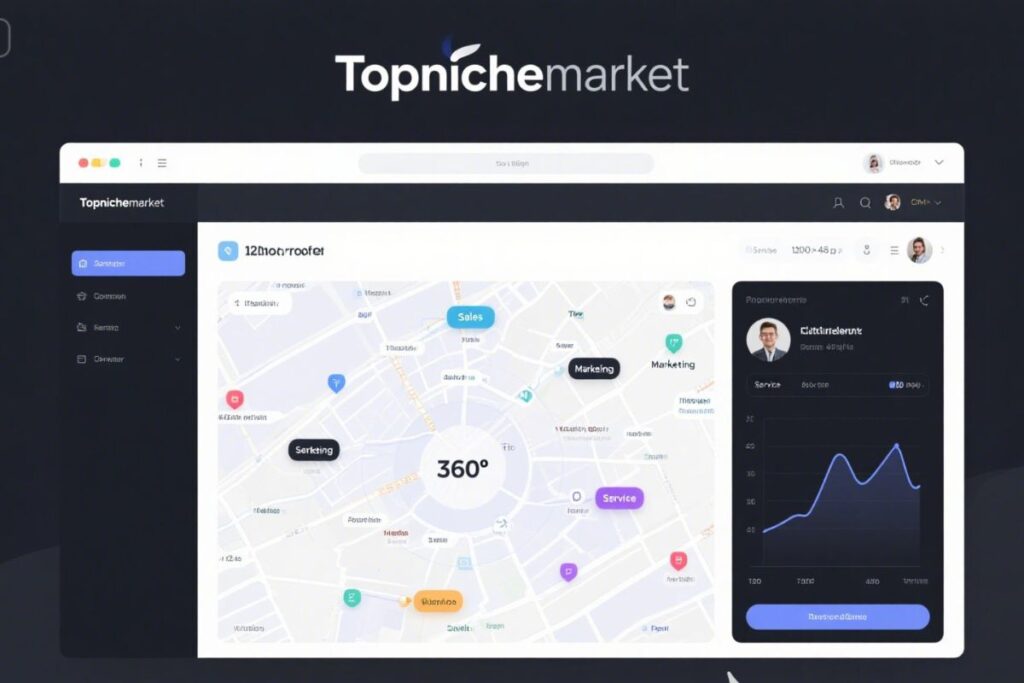
Introduction What is Agile CRM and Why is it Trusted by 15,000+ Customers
At its fundamental core, Agile CRM is envisioned and built as a comprehensive, deeply integrated software solution. Its design explicitly covers the three essential pillars of modern customer engagement strategy: sales management, marketing automation, and customer service delivery. It differentiates itself by positioning itself as far more than just a CRM in the traditional sense, which often focuses primarily or solely on contact management and basic sales tracking. Instead, Agile CRM aims to be a complete, holistic platform specifically intended to support, automate, and streamline workflows that span the entire customer journey. This journey begins with the initial lead capture and interest generation and extends through active nurturing, sales conversion, and crucially, ongoing customer support and relationship retention.
The central, driving philosophy behind the creation of Agile CRM is to eliminate the prevalent need for businesses to piece together and manage multiple, separate software applications. This common scenario involves using one tool for sales CRM tasks, a completely different application for email marketing campaigns and automation, another system potentially hosted elsewhere for managing customer support tickets, and perhaps yet another tool for scheduling or social media interaction. This fragmented architectural approach almost invariably leads to data inconsistencies, as information isn’t shared seamlessly between systems. It makes accurate and timely reporting a significant headache, requiring complex data exports and manual reconciliation. Most importantly, it creates disjointed, frustrating experiences for customers who might interact with different departments (sales, support, marketing) and feel like they are not dealing with a single, cohesive business entity. Agile CRM is purpose-built to directly address and solve these fundamental problems by providing a unified customer database that serves as a single source of truth, combined with interconnected toolkits for each functional area that draw from and contribute to this central data repository.
The compelling fact that Agile CRM is currently trusted and actively used by a large base of over 15,000 customers is a powerful and significant indicator of its strong adoption rate in the market and the perceived value it consistently delivers. This user base demonstrates that Agile CRM is far from being a niche or untested player; it is a platform that has successfully gained substantial traction and proven its worth across a wide variety of industries, business models, and organizational sizes. This broad appeal strongly suggests that Agile CRM effectively meets genuine, pressing business needs for a large and diverse community of users. Businesses that make the strategic choice to adopt Agile CRM are very likely seeking tangible improvements in operational efficiency, a true 360-degree panoramic view of their customers accessible to all relevant teams, and often, significant cost savings achieved by consolidating their previously disparate software stack under one vendor and platform. The sheer volume of trust placed in Agile CRM by such a substantial number of users speaks volumes about its demonstrated reliability, practical effectiveness, and ability to deliver real-world results for a multitude of organizations.
The primary purpose of this detailed review is to provide an honest, balanced, and in-depth examination of Agile CRM specifically as it stands for the year 2024. Drawing upon the information provided, we will thoroughly dissect its stated capabilities, critically evaluate how seamlessly and effectively it integrates its various functions into a cohesive whole, assess its usability for the array of everyday tasks performed by sales, marketing, and service teams, and ultimately determine its overall value proposition. This evaluation will particularly consider its distinct pricing model, including the significant draw of its free plan option. Our ultimate goal is to empower you with a clear, actionable understanding of whether Agile CRM is indeed the comprehensive, all-in-one solution that possesses the potential to significantly propel your business forward, streamline your customer interactions, and enhance your team’s productivity.
Throughout the remainder of this comprehensive article, we will systematically cover the following key areas:
- A meticulously detailed breakdown and analysis of Agile CRM‘s core feature sets specifically designed for sales professionals, marketing teams, and customer service agents.
- A thorough assessment of how easy it is for both new and experienced users to navigate and effectively utilize the Agile CRM interface in their daily tasks.
- Insights into the platform’s technical performance characteristics and its overall reliability as a cloud-based SaaS application.
- A clear, transparent explanation and analysis of Agile CRM pricing structures, evaluating the value it offers at different tiers, giving particular attention to the notable free plan option.
- A balanced perspective presenting both the key advantages (pros) and potential disadvantages (cons) associated with choosing and using Agile CRM as your primary customer relationship platform.
- A summary of what the wider user community and existing customers generally say about their practical experiences using Agile CRM.
- A final, conclusive verdict to help you make an informed decision about whether Agile CRM represents the right strategic choice for your specific business needs and operational requirements in 2024.
Let’s now move forward and dive deeper into the very heart of what Agile CRM genuinely offers its users.
Agile CRM Core Features: Your All-in-One Sales, Marketing, and Service Hub
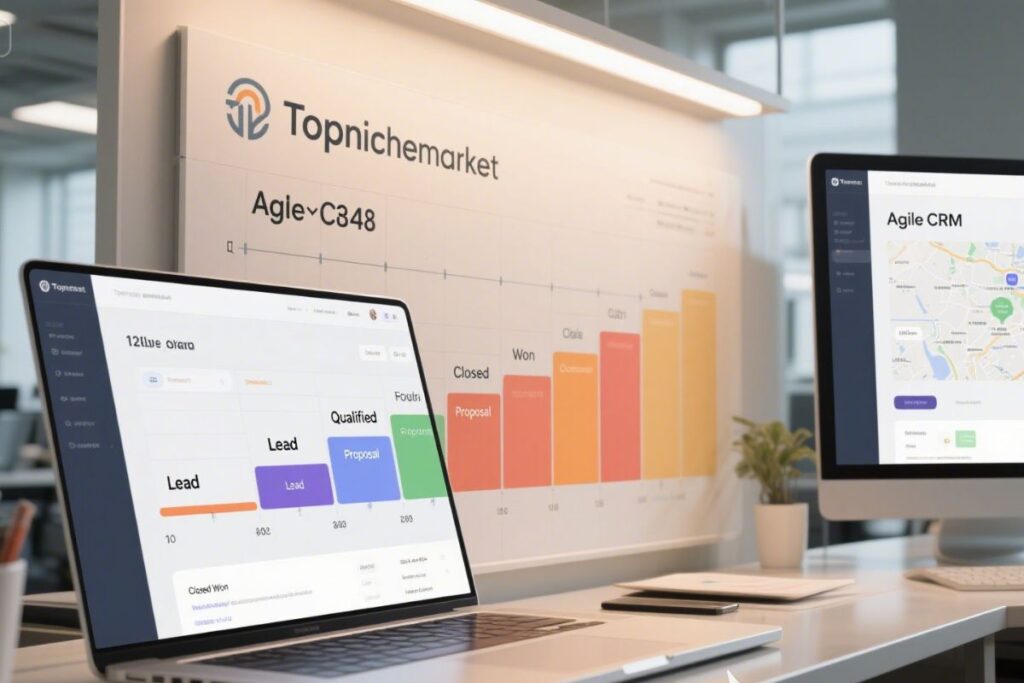
Agile CRM Core Features Your All-in-One Sales, Marketing, and Service Hub
The foundational and most significant promise of Agile CRM rests firmly on its central claim to function as a truly all-in-one platform. This means that unlike traditional or single-purpose software, Agile CRM provides a comprehensive suite of integrated toolkits. These tools are specifically designed to support, manage, and automate processes that span the critical customer-facing areas of your business. Rather than requiring you to purchase, integrate, and manage separate software tools for each distinct function, Agile CRM brings them together under a single roof, with the explicit goal of achieving seamless data flow, consistent reporting, and streamlined workflows across your entire organization. This integrated approach within Agile CRM aims to eliminate operational friction and enhance the overall customer experience. Let’s systematically break down and explore the key feature sets that are prominently offered by Agile CRM.
Sales Features: Empowering Your Sales Team to Close More Deals
A robust, intuitive, and feature-rich CRM system serves as the absolute backbone of any truly successful sales operation. Agile CRM provides a comprehensive suite of tools that are specifically aimed at empowering sales teams. These tools help them efficiently manage leads, diligently track the progress of deals through the pipeline, communicate effectively and contextually with prospects and customers, and maintain a high level of organization in their daily activities. The sales capabilities within Agile CRM are designed to boost productivity and improve conversion rates.
- Contact Management:This feature is absolutely foundational to any CRM system, and Agile CRM excels by providing a centralized hub for all your crucial contact information. This includes leads that are just entering your funnel, prospects who are being qualified, and existing loyal customers. Within Agile CRM, each contact record offers a comprehensive 360-degree view. This view encompasses their complete interaction history, all logged activities, internal notes added by team members, any linked deals they are associated with, and a timeline of activities and engagement. This centralized approach effectively eliminates scattered data across spreadsheets or various systems. It ensures that every sales representative has immediate access to all the necessary context and historical information before engaging with a contact, leading to more personalized, informed, and ultimately effective communication. Managing contacts efficiently and having a complete history readily available within Agile CRM is key to ensuring no potential lead or crucial customer interaction falls through the cracks.
- Deals:Visual pipeline management is not just useful; it’s absolutely crucial for sales teams to effectively track the progress of potential revenue opportunities. Agile CRM allows sales teams to easily create, manage, and visually track deals as they move through customizable sales pipelines. Sales professionals and managers can quickly see the current stage of each deal, its estimated value, the expected closing date, and a list of related activities or tasks. This provides clear, immediate visibility into the entire sales funnel, significantly helping sales managers accurately forecast revenue and enabling individual sales representatives to effectively prioritize their efforts on the most promising opportunities. The process of moving deals through the various stages of the pipeline within Agile CRM is designed to be intuitive and reflect your specific sales process.
- Telephony:Integrated communication tools are invaluable for saving time, reducing manual data entry, and streamlining sales workflows. Agile CRM includes either built-in telephony features or offers easy, robust integrations with popular third-party providers like Twilio and RingCentral. This seamless integration allows sales representatives to directly make outbound calls from within the CRM interface. Crucially, it automatically logs call activities, including the date, time, duration, and outcome. Where permitted and configured, it can also facilitate call recording. This ensures that all communication history, including phone calls, is managed alongside other contact data, providing a complete interaction record. Efficient communication is a cornerstone of successful sales, and the integrated telephony features in Agile CRM directly support this by making call logging and management effortless.
- Appointment Scheduling:The back-and-forth email chain often required to schedule meetings with prospects or clients can be a significant drain on productivity. Agile CRM offers integrated appointment scheduling capabilities designed to solve this. This feature allows prospects, leads, or existing clients to easily view a sales representative’s availability and book meetings directly based on their open time slots. This process automatically creates the event in the representative’s calendar and crucially, links the scheduled meeting directly to the relevant contact or deal record within the CRM. This integrated scheduling tool within Agile CRM saves significant administrative time for sales teams and dramatically reduces friction in the scheduling process for both parties involved.
- Project Management:While primarily a CRM focused on sales, marketing, and service, the thoughtful inclusion of project management features suggests that Agile CRM aims to support tasks that extend beyond the initial sales closing, particularly related to post-sales activities. This might include client onboarding processes, implementation projects for new customers, or managing ongoing client work or support tasks that require structured project tracking. This allows teams to manage follow-up tasks, track project milestones, and collaborate on these essential post-sales activities directly within the very same platform where all the core contact, deal, and communication data resides. Managing related projects and tasks alongside the core CRM data in Agile CRM provides a more complete and integrated operational picture of the customer relationship lifecycle.
- Gamification:Motivating a sales team and fostering a positive, results-driven environment can be significantly boosted through elements of friendly competition and recognition. Agile CRM incorporates gamification features that allow sales managers to set up contests based on key performance indicators (KPIs) like calls made, deals closed, or revenue generated. The platform can track performance against these goals, awarding points, badges, or virtual trophies to high achievers. This feature is designed to make the often challenging sales process more engaging, fun, and encouraging of desired sales behaviors among team members, fostering a healthy competitive spirit. The gamification functionality in Agile CRM adds an extra layer of team dynamics and performance motivation.
- CRM Reporting:Analyzing sales performance data is not just important; it’s absolutely vital for understanding what’s working, identifying areas for improvement, and making informed strategic decisions. Agile CRM provides robust reporting features that allow users to track key sales metrics comprehensively. This includes monitoring the health and flow of the sales pipeline, evaluating the performance of individual sales representatives or teams, analyzing conversion rates at different stages, and forecasting future revenue based on pipeline data. Having immediate and easy access to detailed sales reports directly within the Agile CRM platform helps teams quickly identify bottlenecks in their process, gain clear insights into successful strategies, and pivot based on data-driven understandings. This reporting capability in Agile CRM empowers sales leadership and representatives alike.
Marketing Features: Automating Engagement and Nurturing Leads
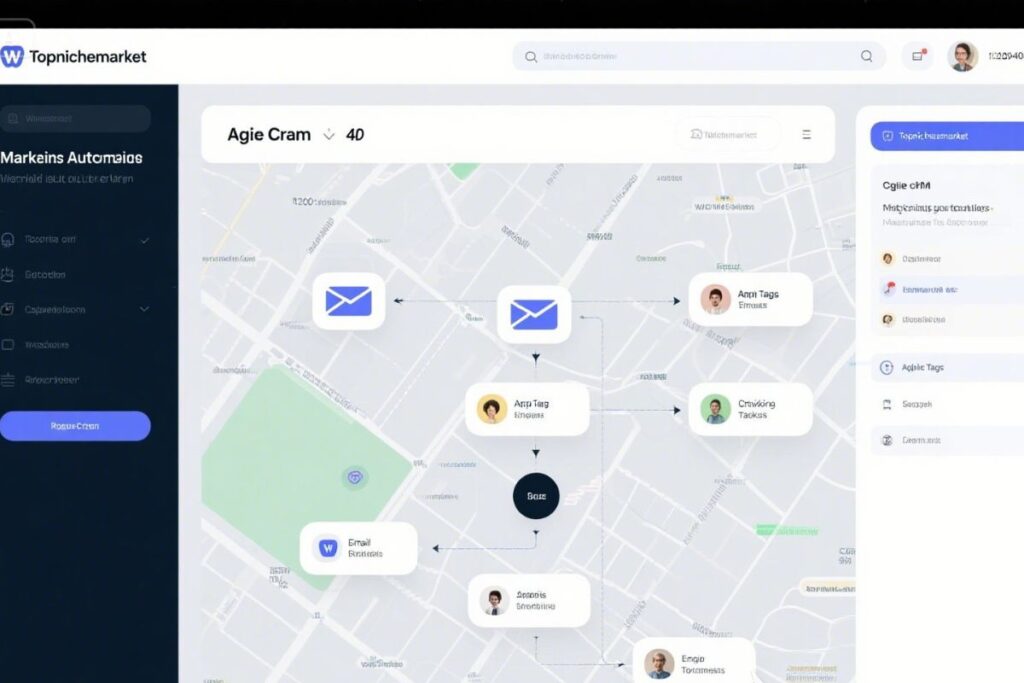
Marketing Features Automating Engagement and Nurturing Leads
In today’s digital landscape, effective marketing is critically about reaching the right audience with the most relevant message at precisely the optimal time. Agile CRM offers a comprehensive and powerful set of marketing tools that are specifically designed to automate repetitive processes, efficiently nurture leads through the sales funnel, and diligently track prospect engagement across various channels. The marketing capabilities within Agile CRM are geared towards maximizing reach, relevance, and conversion.
- Marketing Automation:This is unequivocally one of the core strengths and most powerful capabilities offered by Agile CRM. The platform allows businesses to visually create sophisticated automated workflows based on specific triggers and predefined actions. For instance, you can easily set up a workflow to automatically send a personalized welcome email series when a new lead signs up via your website form. Another example might be automatically assigning a lead to a specific sales representative based on their demographic information, company size, or their level of engagement with your website or marketing content. This level of marketing automation within Agile CRM saves marketing teams an immense amount of manual work and ensures timely, relevant, and consistent communication with every lead and customer throughout their journey.
- Email Marketing:Sending targeted, engaging email campaigns remains a standard and highly effective marketing practice. Agile CRM includes built-in, user-friendly email marketing capabilities. This allows users to design visually appealing email templates using drag-and-drop builders, easily send targeted campaigns to specific segments of their contact list, and comprehensively track the performance of these campaigns (including open rates, click-through rates, bounces, etc.). When combined with the rich segmentation capabilities provided by the contact data residing in the Agile CRM database, this feature enables the creation and execution of highly segmented and personalized emails. This personalization significantly improves engagement metrics such as open and click-through rates. The integrated email marketing within Agile CRM ensures that all campaign-related data is automatically linked back to the corresponding contact records, providing valuable context.
- Landing Page Builder:Effectively capturing leads and converting website visitors often requires dedicated, conversion-focused landing pages designed for specific campaigns or offers. Agile CRM provides an integrated landing page builder that empowers marketers to create these critical pages without needing external tools, complex integrations, or requiring advanced coding expertise. These landing pages can be directly linked to your marketing campaigns (like email blasts or social ads) and are designed to capture lead information straight into the Agile CRM database. This seamless connection streamlines the entire lead generation process, making it easier to track the source and effectiveness of leads acquired through dedicated pages built within Agile CRM.
- Social Suite:Integrating social media into your marketing and customer engagement efforts is increasingly crucial for building brand presence, driving engagement, and monitoring online conversations. Agile CRM‘s social suite allows businesses to connect their official social media accounts, such as Twitter, Facebook, and LinkedIn (as is standard practice and likely included based on the outline source), directly to the CRM platform. This integration enables monitoring social mentions of your brand or relevant keywords, engaging directly with contacts or leads on social platforms, and crucially, tracking these social interactions as part of the comprehensive contact history within their CRM record. Managing social interactions and monitoring social signals from within Agile CRM provides a more holistic and complete view of each customer’s engagement across various channels.
- Mobile Marketing:Reaching your target audience effectively on their mobile devices is no longer a niche strategy; it’s a fundamental requirement for modern marketing. While the outline provided doesn’t specify the exact mechanics of how Agile CRM facilitates mobile marketing, its inclusion in the feature list suggests capabilities related to mobile communication channels. This could potentially include features supporting SMS marketing campaigns, enabling tracking of engagement with mobile-optimized content, or potentially even push notifications for users of a linked mobile app (if applicable). The explicit mention of mobile marketing capabilities in Agile CRM underscores its aim to provide tools covering a wide spectrum of modern communication touchpoints used by customers.
- Email Tracking:Understanding how recipients interact with your marketing emails is absolutely key to optimizing campaign performance and gauging individual prospect interest. Agile CRM offers robust email tracking features that provide detailed insights. Users can see precisely when their emails are opened by recipients, which links within the email are clicked, and other valuable metrics related to recipient engagement. This critical data is automatically linked back to the corresponding contact record within Agile CRM. This allows both marketing teams to refine their strategies based on aggregate data and sales teams to gauge the interest level of specific prospects based on their engagement, enabling more timely and targeted follow-up. Tracking email engagement is a seamless and integrated process within Agile CRM, directly informing subsequent actions.
Service Features: Enhancing Customer Support and Satisfaction
Providing timely, efficient, and empathetic customer service is critically important for building lasting customer loyalty, reducing churn, and fostering positive word-of-mouth referrals. Agile CRM extends its core all-in-one philosophy to the service realm by providing a suite of tools specifically designed to manage customer support inquiries efficiently and effectively. The service capabilities within Agile CRM aim to improve resolution times and enhance customer satisfaction.
- Helpdesk:The integrated helpdesk system forms the core of the service management functionality within Agile CRM. This system is designed to serve as a central hub for receiving, organizing, and systematically managing all incoming customer support requests. These requests, often referred to as tickets, can originate from multiple channels, including incoming emails, web forms submitted on your website, or potentially other integrated sources. By centralizing all these requests within the Agile CRM helpdesk, it becomes significantly easier for your support agents to see, prioritize, assign, and respond to customer issues from a single interface. Operating a helpdesk directly within Agile CRM automatically links every support interaction directly to the corresponding customer’s comprehensive CRM record, giving agents full historical context.
- Ticketing:Managing customer support requests using a structured ticketing system is standard and best practice for ensuring accountability and efficient resolution. Agile CRM‘s integrated ticketing system allows support agents and managers to track the current status of each individual customer issue from submission to resolution. They can easily assign tickets to specific agents based on expertise or workload, set priority levels to ensure urgent issues are addressed promptly, and monitor key performance indicators such as initial response times and average resolution times. This structured ticketing functionality within Agile CRM ensures accountability, prevents tickets from being lost, and helps support teams effectively manage their workload even during busy periods.
- Knowledge Base:Empowering your customers to quickly find answers to their common questions independently is a highly effective strategy for reducing the volume of incoming support requests and improving customer satisfaction by providing immediate help. Agile CRM supports the creation and maintenance of a customer-facing knowledge base. This is a repository of helpful articles, frequently asked questions (FAQs), step-by-step guides, and troubleshooting tips that customers can access and search independently through a dedicated portal or link. A well-organized and regularly updated knowledge base built and managed within Agile CRM can significantly improve the efficiency of your support team by deflecting common inquiries and simultaneously enhance customer satisfaction by providing instant access to information 24/7.
- Smart Views:Efficiently organizing and prioritizing support queues is absolutely essential for managing ticket volume and ensuring that critical issues are addressed in a timely manner. Agile CRM offers a feature referred to as “Smart Views.” These are essentially dynamic, highly customizable filters that can be applied to the ticket list. Support managers or agents can use Smart Views to quickly create filtered lists such as “High-Priority Tickets,” “Tickets Assigned to Me,” “Tickets from VIP Customers,” or “Tickets with No Activity in 24 Hours.” This capability ensures that support agents can quickly access the tickets that require their immediate attention or fit specific criteria, significantly improving response times and overall support team productivity. Using Smart Views in Agile CRM helps teams navigate and manage complex ticket volumes effectively.
- Canned Responses:Speeding up response times to common questions is a critical factor in improving customer service efficiency and agent productivity. Agile CRM allows support agents to create and utilize canned responses. These are pre-written, standardized replies to frequently asked questions or common support scenarios. Instead of typing out the same explanation repeatedly, an agent can quickly insert a canned response and personalize it slightly if needed. This saves agents significant time throughout their day, ensures consistency and accuracy in communication for common issues, and directly contributes to faster resolution times for customers. Canned responses are a simple yet remarkably powerful efficiency-boosting tool integrated within the service features of Agile CRM.
Integrations: Connecting Your Agile CRM with the Tools You Already Use
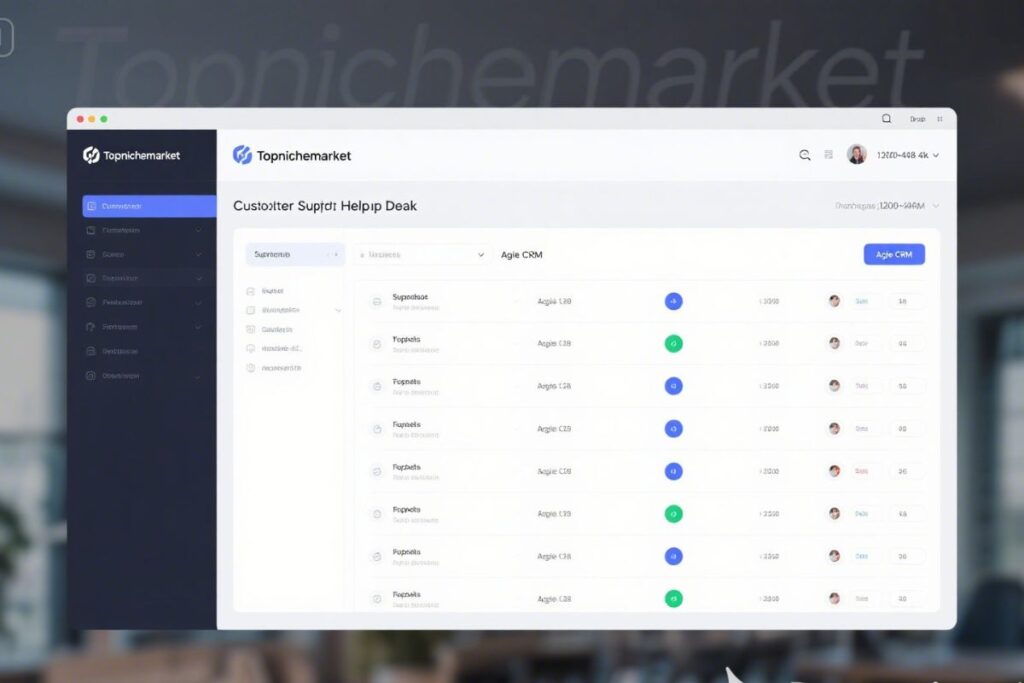
Integrations Connecting Your Agile CRM with the Tools You Already Use
In the interconnected world of business software, no single application truly exists in isolation. Agile CRM recognizes the critical importance of being able to seamlessly connect and interact with the multitude of other applications and tools that businesses rely on in their daily operations. The outline explicitly highlights the presence of robust, seamless connections with popular third-party applications. This strong integration capability is a key factor in the utility and versatility of Agile CRM. Examples of these crucial integrations mentioned directly or strongly implied include:
- Google Apps:Integration with Google Workspace, which includes widely used services like Gmail and Google Calendar, is absolutely vital for many businesses that operate within the Google ecosystem. Agile CRM likely offers deep integrations for automatically syncing emails related to contacts (logging them in the CRM timeline) and syncing calendar events, allowing sales representatives to schedule meetings and manage their time directly within the CRM interface or ensuring that relevant activities from Gmail and Calendar are automatically reflected within the Agile CRM contact and deal records.
- Social (Twitter, Facebook, LinkedIn):As previously noted in the marketing feature section, integrations with major social media platforms are essential. Agile CRM‘s connections enable monitoring relevant social conversations, directly engaging with prospects and customers on these platforms, and importantly, tracking these social interactions as part of the complete contact history within the CRM environment. This consolidates social activity into the 360-degree customer view provided by Agile CRM.
- Telephony (Twilio, RingCentral):Integration with leading Voice over IP (VoIP) providers is crucial for sales and service teams. Agile CRM‘s integrations allow for click-to-call functionality directly from contact records, automatic logging of call duration and outcomes, and often, the ability to listen to call recordings (subject to legal compliance and configuration). This creates a unified communication log that includes phone calls, emails, and other interactions, all linked to the contact within Agile CRM.
Beyond these specific examples, the mention of “seamless connections” suggests that Agile CRM has developed a broader ecosystem of integrations. This likely includes connections with accounting software (like QuickBooks or Xero), popular e-commerce platforms (like Shopify or WooCommerce), other complementary marketing tools, project management applications, and more. The goal is to allow businesses to connect their core CRM with the specific applications they already use or need, creating a more cohesive, automated, and efficient operational workflow across the entire business. Strong integration capabilities make Agile CRM a significantly more versatile and powerful central hub for customer-related business activities.
The 500apps Ecosystem Link
It is particularly important to note the specific mention of Agile CRM being presented alongside or in connection with the 500apps initiative. While Agile CRM itself is described as a powerful, integrated suite covering sales, marketing, and service, the outline indicates a link to this larger ecosystem. The 500apps bundle is described as offering access to a considerably wider array of business applications, potentially covering areas far beyond CRM, such as productivity tools, human resources management, finance applications, and various other business functions. This connection isn’t explicitly presented as a core feature of Agile CRM itself in the traditional sense, but its prominent mention strongly suggests that users of Agile CRM may have privileged access, special bundle pricing, or integrated options with this larger suite. This association significantly adds to the potential value proposition of Agile CRM. By being linked to the 500apps bundle, it offers the possibility of consolidating a vast array of software needs – potentially over 30 applications – under a single vendor relationship and, crucially, under an extremely aggressive per-user pricing model (specifically noted as $14.99/user for 30+ apps). For a business that requires a CRM plus several other software tools for different departments or functions, this potential access to a large bundle of applications at a remarkably low per-user price alongside Agile CRM could represent extraordinary value and a compelling reason to choose this platform. Access to the broader 500apps suite expands the potential utility and cost-saving benefits derived from adopting Agile CRM and its associated ecosystem.
To summarize, the core features offered by Agile CRM are extensive and deliberately designed to span a wide operational spectrum. The platform aims to provide robust, capable tools for managing every stage of the sales process, automating sophisticated marketing efforts, and handling customer support inquiries efficiently and with structure. The overarching emphasis is placed firmly on integration – allowing data, communication history, and workflows to flow seamlessly between these traditionally siloed departments. This integrated architecture within Agile CRM theoretically creates a more efficient, collaborative, and genuinely customer-centric operation, where every team member has access to the information they need to provide a consistent and informed customer experience.
Ease of Use: Navigating the Agile CRM Interface
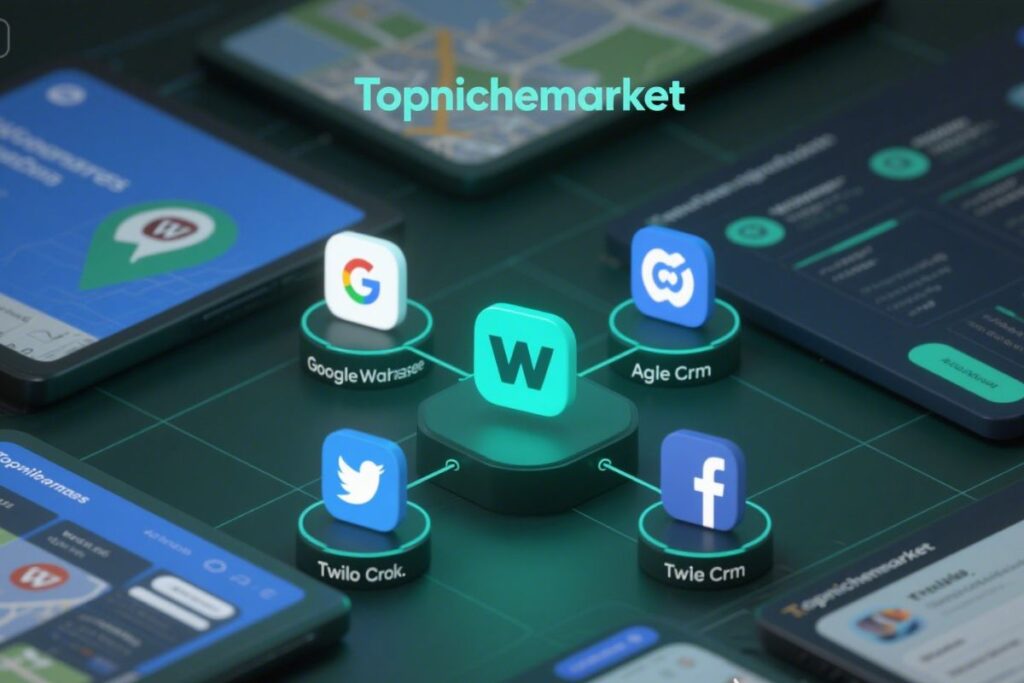
Ease of Use Navigating the Agile CRM Interface
When considering the adoption of any new software, particularly one as comprehensive and multi-functional as an all-in-one CRM solution covering sales, marketing, and service, the ease of use for the end-users is of paramount importance. A software tool, no matter how powerful its features, can only be truly effective if your team members can comfortably and efficiently use it in their day-to-day activities without encountering significant friction, requiring extensive and costly training, or facing a steep, frustrating learning curve. Agile CRM makes a specific claim to be “simple to use,” which is a critical assertion, especially for a platform that is packed with features spanning three major business functions.
Evaluating the user interface (UI) design and the overall user experience (UX) offered by Agile CRM, based on this claim of simplicity, requires careful consideration. It involves balancing the inherent complexity that comes with managing multiple business functions within a single tool against the deliberate design choices made by the vendor to simplify user interactions and workflows. An all-in-one platform, by its very nature and definition, encompasses a significant amount of functionality and data. This often translates into a large number of menus, various settings to configure, numerous reports to access and interpret, and multiple interconnected modules that users need to navigate between. For such a system to be genuinely perceived as “simple” while still offering this depth and breadth of capability, it absolutely needs an intuitive, logically structured layout, clear and easy navigation pathways between different sections, and well-thought-out workflows that mirror typical business processes.
It is realistic to acknowledge that a potential learning curve inherently exists for any tool as broad and deep as Agile CRM, regardless of how strongly simplicity is emphasized in its marketing. New users, particularly those migrating from simpler or single-purpose tools, will need to invest some time to understand where to locate specific features, how to efficiently perform core tasks (such as creating and updating a deal record, setting up a multi-step marketing automation sequence, responding to a customer support ticket while referencing past interactions, or customizing a report), and importantly, how the different sales, marketing, and service modules within Agile CRM connect and share information. While the interface might indeed be clean, visually appealing, and logically structured, truly mastering the full potential and capabilities of an integrated system covering sales, marketing, and service invariably takes time, practice, and exploration. The key challenge for Agile CRM is to design and support the user journey from novice to proficient user in a way that is as smooth, intuitive, and minimally frustrating as possible.
To actively support users in effectively navigating the platform, understanding its capabilities, and successfully overcoming any potential learning curve, the outline thoughtfully mentions several key resources and support mechanisms provided by Agile CRM:
- Support:This likely refers to the standard technical support channels that users can access when they encounter technical issues, have questions about features, or need assistance with configuration. This could include options such as submitting support tickets directly through the platform, dedicated email support addresses, or potentially live chat or phone support options, depending on the specific pricing plan the user is subscribed to. Accessible, knowledgeable, and responsive support is critically important when users encounter unexpected behavior or have specific questions about how to best utilize specific features within Agile CRM for their unique needs.
- Resources:This category typically encompasses a variety of self-help and educational materials provided by the vendor. For Agile CRM, this could include a comprehensive library of blog posts offering best practices and tips, recorded webinars on various topics (like advanced automation or pipeline management), customer case studies demonstrating successful implementations, detailed guides on specific features, and tutorials. A rich, easily searchable resource library significantly enhances a user’s ability to learn at their own pace, discover new ways to leverage the platform, and continuously grow their proficiency with Agile CRM.
- On-Boarding:Structured on-boarding programs are absolutely vital for ensuring that new users and businesses can get up to speed with a complex platform quickly and efficiently. This suggests that Agile CRM provides guided processes and potentially personalized assistance specifically designed to help businesses successfully configure the platform according to their unique operational needs, effectively migrate any existing data from previous systems, and train their teams on how to use the software from the very outset. Effective on-boarding minimizes initial user frustration, accelerates the time it takes for businesses to start deriving value from Agile CRM, and lays a solid foundation for successful long-term adoption.
- Training:Dedicated training materials, which might come in the form of video tutorials, online courses, documentation, or even live training sessions (depending on the plan), help users develop a deeper understanding of the full breadth of Agile CRM‘s features and, crucially, how to effectively apply these features to their specific roles, responsibilities, and workflows within the organization. Comprehensive training options mean that teams are better equipped to fully leverage the capabilities of Agile CRM to meet their departmental and business objectives.
- Setup Guides:Step-by-step, detailed guides for configuring the various aspects of the platform are essential documentation. This includes guides for setting up crucial third-party integrations, customizing sales pipelines to match your process, creating marketing email templates, configuring helpdesk queues and automation rules, and tailoring other settings. These setup guides empower users to successfully configure and tailor Agile CRM to align precisely with their specific business processes and requirements without needing constant external assistance.
- Talk to a Specialist:Offering direct access to specialists implies that Agile CRM provides personalized assistance for users who might have complex configuration needs, require strategic advice on how to best utilize the platform for specific business challenges, or need help troubleshooting more intricate issues. This level of personalized support can be incredibly valuable for businesses that are trying to implement and maximize the effectiveness of Agile CRM within their unique operational context.
The overall availability, accessibility, and quality of these comprehensive support resources provided by Agile CRM play an enormously significant role in determining whether the platform is ultimately perceived as “simple” or potentially overwhelming in practical day-to-day use. A well-designed, intuitive user interface, when combined with readily available, high-quality support documentation, guided on-boarding, and ongoing training materials, has the power to make even a deeply feature-rich and complex platform accessible and usable for a wide spectrum of business users with varying technical proficiencies.
Furthermore, consider the ease with which users can access and utilize the reporting features, which are explicitly mentioned in both the Sales and Service sections (e.g., CRM Reporting). If obtaining valuable insights and analytics from the data within your CRM requires navigating through complex menus, understanding obscure settings, or interacting with a non-intuitive interface, it significantly hinders adoption rates and limits the actual business value derived from the platform. A user-friendly, easily navigable reporting interface within Agile CRM is absolutely key to making data-driven decision-making accessible and practical for sales managers, marketing leads, customer service supervisors, and even individual contributors.
While “simple to use” is ultimately a subjective claim that will vary depending on the individual user’s technical background and prior experience, the extensive range of support resources actively offered by Agile CRM clearly indicates a deliberate and significant effort on the vendor’s part to mitigate the potential complexity that is naturally inherent in an all-in-one system of this scope. The true test of usability for any given user or business will depend on their specific daily requirements, their willingness to engage with the comprehensive learning materials provided, and their team’s adaptability. The overarching goal of Agile CRM in its design and support strategy is clearly to make a powerful, integrated business system manageable, efficient, and accessible for the average everyday business user across sales, marketing, and service departments.
Performance & Reliability: How Agile CRM Delivers

Performance & Reliability How Agile CRM Delivers
In today’s fast-paced and interconnected digital economy, the technical performance characteristics and the overall reliability of cloud-based software applications are no longer merely desirable attributes; they are fundamental, non-negotiable requirements for business continuity and productivity. Users across all departments expect their essential business applications to be consistently fast, virtually always available, and continuously improving over time through ongoing development. Agile CRM directly addresses these critical concerns in its positioning. It explicitly labels itself as a “Next-Generation” CRM solution, a term that implies modern architecture and capabilities, and specifically highlights being both “fast” in operation and provided as a “Cloud based SaaS service.” Let’s delve into what these assertions mean in practice regarding the performance and reliability you can expect from Agile CRM.
The explicit claim of being “fast” suggests that users should anticipate quick load times when accessing different sections of the platform, a responsive user interface that reacts instantly to clicks and inputs, and rapid data processing capabilities when performing tasks like searching, filtering, or generating reports. In a CRM system that is actively used throughout the day by potentially dozens or even hundreds of sales representatives, marketing specialists, and customer service agents, speed is absolutely crucial for maintaining high levels of productivity and preventing user frustration. Slow or laggy software can lead to significant wasted time, break concentration, and dramatically decrease overall operational efficiency. If Agile CRM genuinely delivers on its promise of speed, it means that critical daily tasks – such as searching for a contact record, opening a deal file to check its status, running a pipeline report for a morning meeting, or navigating between the sales, marketing, and service modules – happen with minimal delay. This allows users to maintain their workflow momentum and accomplish more in less time. A fast and responsive experience with Agile CRM directly and positively contributes to user satisfaction and enhances the overall speed of your business operations.
Being a “Cloud based SaaS service” speaks directly and powerfully to the reliability, accessibility, and scalability of the platform. As a software-as-a-service (SaaS) application delivered via the cloud, Agile CRM is inherently accessible from virtually anywhere with a stable internet connection. This access is typically available on a variety of devices, including desktop computers, laptops, and potentially mobile devices (aligning with the “mobile-ready” aspect often implied by “Next-Generation” software). This cloud-based delivery model eliminates the need for individual businesses to invest in, manage, and maintain their own physical servers, complex network infrastructure, or local software installations. This significantly reduces internal IT overhead, complexity, and ongoing maintenance costs. In this model, the service provider – in this case, Agile CRM – assumes full responsibility for managing and maintaining the underlying IT infrastructure, ensuring high levels of uptime and availability, performing regular data backups, implementing robust security measures, and handling all software updates and maintenance. This approach typically offers significantly higher reliability and resilience compared to traditional on-premise software solutions, as the provider specializes in keeping the service running smoothly, securely, and optimally for a large base of thousands of customers simultaneously. The underlying cloud infrastructure supporting Agile CRM is designed and built for high availability, scalability to accommodate growing user bases and data volumes, and inherent resilience against potential issues.
The outline also explicitly notes the presence of regular “Product Updates.” This is a very strong and positive indicator of a healthy, actively developed, and continuously improving software platform. Regular updates mean that the software vendor, Agile CRM, is consistently working behind the scenes to introduce new or enhanced features, proactively fix any reported bugs or issues, strengthen security protocols in response to evolving threats, and generally adapt the platform to keep pace with technological advancements and the evolving needs of its users. For a critical business application like a CRM, which is central to customer interactions and operational workflows, this commitment to continuous improvement is particularly important as customer expectations change, business processes evolve, and new technologies emerge. Knowing that Agile CRM receives regular, presumably seamless, updates provides users and businesses with confidence that the platform will remain modern, secure, performant, and increasingly capable over time without requiring manual installations or disruptive upgrades on their end. These ongoing product updates in Agile CRM clearly demonstrate a commitment to long-term quality, security, and innovation for their user base.
While the provided text for this review does not include specific, quantifiable data accuracy metrics or precise performance benchmarks (such as guaranteed uptime percentages, average page load times under specific load conditions, or detailed reports on data synchronization reliability), the explicit assertions of being fast, built on cloud infrastructure as a SaaS service, and subject to regular product updates form a solid basis for evaluating the fundamental performance and reliability characteristics of Agile CRM. For the vast majority of small to medium-sized businesses, a platform that is described as fast, readily accessible from anywhere via the cloud, and continuously improved through regular updates meets the fundamental requirements for reliable and performant business software in 2024. Based on these descriptions, users can generally expect Agile CRM to be consistently available when they need it and capable of performing their required tasks efficiently and reliably.
Agile CRM Pricing & Value: Affordable Options for Every Business?
Pricing is consistently one of the most significant and often deciding factors for businesses when they are evaluating and choosing a new CRM system, especially for budget-conscious small and medium-sized businesses (SMBs). Agile CRM directly addresses this crucial consideration by explicitly claiming to be “Affordable” and, notably, by offering a very generous and accessible “FREE for 10 Users” plan. The outline specifically highlights that this free tier requires “No credit card required,” which is a notable detail that further lowers the barrier to entry. This highly generous free plan is a major selling point and allows businesses, particularly startups and small teams, to easily test the waters, explore the platform’s core functionalities, and experience Agile CRM firsthand without any financial commitment whatsoever or even the need to provide sensitive payment information upfront. The availability of a robust free tier supporting up to 10 users makes Agile CRM exceptionally accessible to a wide range of potential users.
The claim of being “Affordable” extends beyond the free plan and suggests that even the paid plans offered by Agile CRM are priced competitively relative to the extensive feature set they provide. This is particularly true when you consider the cost of purchasing and managing separate software licenses for sales CRM functionality, a dedicated marketing automation platform, and a standalone helpdesk system. An all-in-one solution like Agile CRM inherently offers the potential for significant cost savings by consolidating multiple software subscriptions into one single, manageable vendor relationship and billing cycle. Evaluating the true affordability of Agile CRM involves not just looking at the monthly or annual cost of its paid tiers in isolation, but critically comparing that cost to the combined expense, complexity, and potential integration challenges of using alternative point solutions from different vendors for each functional area (sales CRM, marketing automation software, customer service helpdesk software).
Adding a further, potentially transformative layer to the overall value proposition is the connection, as highlighted in the outline, to the 500apps initiative. The outline notes a specific pricing point associated with this ecosystem: $14.99/user for 30+ apps. It is crucial to understand that this price point is presented alongside the discussion of Agile CRM, strongly implying that Agile CRM is either included as one of the 30+ applications in this bundle or that being an Agile CRM customer provides access to this bundle at this rate. While this “$14.99/user for 30+ apps” figure is not necessarily the standalone pricing for Agile CRM itself (which would logically have its own tiered pricing structure based on features and user count beyond the free plan), its inclusion here is highly significant. It suggests a potential bundled offer or a pricing strategy where accessing Agile CRM also grants access to a vast suite of other diverse business applications at an exceptionally competitive per-user price point. If a business requires not only a robust CRM but also needs other complementary tools such as HR management software, project management tools, various productivity applications, finance tracking, etc., the 500apps bundle associated with Agile CRM could potentially represent extraordinary, unparalleled value. It offers the ability to consolidate a vast array of software needs – covering numerous departments and functions – under a single vendor with an extremely low per-user monthly fee. This $14.99/user price point for over 30 applications (including potentially Agile CRM within that suite) is remarkably aggressive in the market and could be a profoundly compelling draw for businesses prioritizing maximum value, software consolidation, and cost efficiency across their entire technology stack.
Evaluating the perceived value for money offered by Agile CRM therefore depends heavily on several interconnected factors:
- Features vs. Cost Analysis:Does the comprehensive breadth and practical depth of features offered within Agile CRM‘s various paid plans genuinely justify the subscription cost? For businesses that can fully leverage and actively utilize the integrated sales, marketing, and service modules, the inherent value of having everything seamlessly consolidated into one single, unified platform can significantly outweigh the cost when compared to the administrative burden, integration challenges, and cumulative subscription fees of managing multiple point solutions.
- Utility of the Free Plan:For very small businesses, startups, or teams consisting of 10 or fewer users, the free plan offered by Agile CRM provides substantial, tangible value. It offers core CRM, essential marketing automation, and fundamental service management capabilities at absolutely no financial cost. This is a significant competitive advantage in the market and makes Agile CRM an incredibly attractive option for businesses that are just starting out, operating on a very tight budget, or simply wanting to explore the benefits of a CRM without initial investment.
- The 500apps Bundle Impact:If, as strongly implied, the stated “$14.99/user” price includes Agile CRM and provides access to 30+ other essential business applications, the value proposition is dramatically amplified. For a business that can leverage even just a few of these additional applications beyond the core CRM functionality, this pricing model transforms the decision to choose Agile CRM from simply a CRM purchase into an investment in a vast, incredibly affordable software ecosystem covering numerous operational needs. This potential access fundamentally changes the calculation of value provided by Agile CRM.
In summary, Agile CRM strategically positions itself as a highly affordable CRM solution, starting with a remarkably attractive and genuinely free plan for up to 10 users that requires no credit card. Its overall value proposition is further significantly enhanced by its comprehensive, integrated feature set across sales, marketing, and service. Most notably, the potential access to a large suite of over 30 other business applications through the associated 500apps bundle at an exceptionally low per-user price creates a value offering that is potentially unmatched in the broader business software market. Businesses specifically seeking to consolidate their software tools, manage their operational costs effectively, and gain access to powerful integrated customer relationship management capabilities will likely find Agile CRM‘s pricing structure and associated bundle very appealing and strategically advantageous in 2024.
Pros & Cons: A Balanced Look at Agile CRM
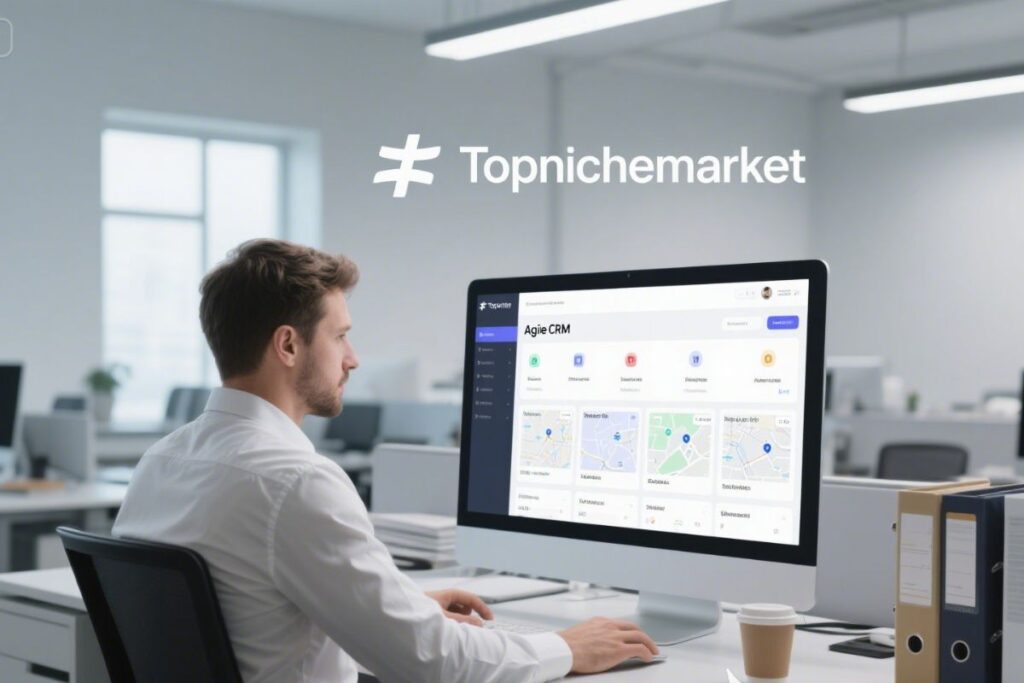
Pros & Cons A Balanced Look at Agile CRM
Selecting the most suitable CRM platform for your business involves carefully weighing the potential benefits and advantages against any potential drawbacks or disadvantages. While Agile CRM presents a compelling and well-articulated case as an all-in-one, highly affordable, and feature-rich solution, it is crucial for any prospective user to consider both sides of the coin in a balanced assessment. Based directly on the features, claims, and descriptions provided in the outline for this review, here is a balanced look at the key advantages (Pros) and potential disadvantages (Cons) of choosing and implementing Agile CRM.
Agile CRM Advantages (Pros)
- Truly All-in-One Integrated Platform:This is arguably the most significant and foundational advantage offered by Agile CRM. It successfully combines core sales management, comprehensive marketing automation, and efficient customer service functionalities into a single, cohesive software system. This integrated architecture inherently eliminates the problems associated with data silos, where information is isolated in different systems. It ensures that all relevant team members have access to a complete, 360-degree view of the customer journey and interactions. Furthermore, it significantly streamlines workflows and improves collaboration between traditionally separate departments. This approach also helps businesses avoid the often considerable cost, complexity, and technical challenges associated with integrating multiple, separate software tools from different vendors. Having sales, marketing, and service data and tools unified within Agile CRM is a powerful driver of efficiency, collaboration, and improved customer experience.
- Highly Affordable Pricing, Including a Generous Free Plan:The “FREE for 10 Users” plan stands out as a major competitive differentiator and draw for Agile CRM. This zero-cost entry point makes the platform exceptionally accessible to startups, very small businesses, or teams wanting to evaluate its capabilities thoroughly without any financial risk or upfront commitment. The overall claim of being “Affordable” suggests that even as businesses grow and need to upgrade to paid plans, the pricing structure for Agile CRM remains competitive and offers strong value for the extensive feature set provided, particularly when compared to the cumulative cost of subscribing to multiple specialized point solutions for sales, marketing, and service separately. The availability of a genuinely free option for Agile CRM is a significant market advantage that lowers barriers to adoption.
- Comprehensive and Broad Set of Features:Across its core pillars, Agile CRM offers a wide array of functionalities designed to meet the diverse needs of sales, marketing, and service teams. This includes essential sales tools like detailed Contact Management, visual Deals pipelines, integrated Telephony, and Appointment Scheduling. For marketing, it provides powerful Marketing Automation, integrated Email Marketing, a user-friendly Landing Page Builder, a Social Suite, and Mobile Marketing capabilities. On the service side, it includes a robust Helpdesk, Ticketing system, Knowledge Base support, and Smart Views for managing requests. This means Agile CRM covers most of the core operational requirements for customer-facing activities within a single, integrated platform. The feature depth within Agile CRM is designed to support and streamline complex business processes across multiple departments.
- Modern, Cloud-Based, Fast, and Mobile-Ready Architecture:Positioned as a “Next-Generation” platform, Agile CRM is built on modern cloud technology. This provides crucial benefits such as accessibility from any location with internet access, automatic and seamless software updates managed by the vendor, and high availability and reliability. The claim of being “fast” points to a responsive and efficient user experience, which is essential for daily productivity in roles that heavily rely on the CRM. Being mobile-ready (as implied by “Next-Generation” and the nature of cloud software) ensures that sales, marketing, and service teams can effectively use Agile CRM whether they are in the office, working remotely, or on the go, further enhancing flexibility and responsiveness. The technical foundation of Agile CRM appears robust and aligned with modern software standards.
- Strong Integration Capabilities:The ability to seamlessly connect with popular third-party applications like Google Workspace services, major social media platforms, and leading telephony providers is a significant strength. These robust integrations allow Agile CRM to function effectively within a business’s existing software ecosystem and extend its capabilities without requiring manual data transfer or complex custom development. This avoids forcing businesses into vendor lock-in for essential related tools and allows them to create more connected and automated workflows. Integrating other best-of-breed tools with Agile CRM enhances its power and versatility as a central hub.
- Trusted by a Large and Active Customer Base:With a user base exceeding 15,000 customers, Agile CRM is clearly a proven and widely adopted solution in the market. This substantial number of users indicates that the platform is stable, generally reliable, and has a track record of successfully meeting the real-world needs of a large and diverse group of businesses over time. The size of the community using Agile CRM provides a level of confidence in its capabilities, support structure, and ongoing viability.
- Potential Access to a Vast Suite of Additional Tools via the 500apps Bundle:While not a direct feature of the core CRM, the association with the 500apps ecosystem and the mentioned pricing point of $14.99/user for access to 30+ applications (potentially including Agile CRM itself or offering preferential terms) represents a unique and potentially massive value proposition. For businesses looking to consolidate a wide range of software needs – spanning CRM, HR, Productivity, Finance, etc. – under one vendor and at an extremely low per-user cost, the 500apps bundle linked to Agile CRM could be a transformative offering that changes the entire value calculation compared to purchasing software piecemeal.
Agile CRM Disadvantages (Cons)
- Potential for the Breadth of Features to Feel Overwhelming Initially:Despite the claims of simplicity, the sheer scope of an all-in-one platform that encompasses extensive features across three distinct and major business functions (sales, marketing, service) can, in practice, be quite intimidating for new users, especially those with limited prior CRM or marketing automation experience. The significant number of menus, configuration options, settings, and interconnected functionalities within Agile CRM might necessitate a dedicated period for training, exploration, and getting accustomed to the system. This learning curve might be perceived as steeper compared to adopting simpler, single-purpose tools that focus on just one area. While resources are provided, navigating the full breadth of Agile CRM might require commitment.
- Specific Feature Depth Might Be Less Than Highly Specialized Tools:While Agile CRM offers an impressive breadth of features covering the core needs of sales, marketing, and service, it is a possibility that in certain very specific, highly niche areas of functionality (for example, implementing extremely complex, enterprise-level multi-channel marketing automation sequencing with hyper-granular segmentation rules, managing a high-volume helpdesk requiring exceptionally intricate automated ticket routing rules and SLA configurations, or needing super-specialized, industry-specific sales forecasting models), a dedicated, purpose-built tool focused solely on that single function might offer deeper, more specialized capabilities or a higher degree of customization options. Agile CRM‘s strength is its integrated breadth, which sometimes means it might not offer the absolute deepest feature set found in hyper-specialized niche competitors for one specific function alone.
- Limitations on the Free Plan:While the free plan is exceptionally generous, it is explicitly limited to a maximum of 10 users. Growing businesses that successfully utilize the platform and expand their teams beyond this 10-user limit will necessarily need to transition to a paid plan to continue using Agile CRM. While this is a perfectly natural and expected limitation of a free tier, it means that the ‘free’ status is a temporary phase for many successful, scaling companies, and future costs must be factored into long-term planning. Scaling beyond the free tier in Agile CRM requires budget allocation for subscriptions.
- Lack of Explicit Detail on Specific Performance Benchmarks or Data Accuracy (Based solely on provided text):Based purely on the content provided for this review, while Agile CRM is stated to be fast and reliable, there is no explicit inclusion of specific, quantifiable performance metrics. This might include details like guaranteed uptime percentages (e.g., 99.9% uptime SLA), average platform response times under load, or specific details on data synchronization reliability mechanisms. Some businesses, particularly larger or highly data-sensitive organizations, might require access to these specific metrics as part of their due diligence process before committing to a vendor. This is a minor point based only on the information contained within the source outline and is not necessarily indicative of a flaw in the Agile CRM platform itself, but it means an interested business might need to actively seek out this specific information directly from Agile CRM.
In balancing these points, Agile CRM presents a very strong overall case, particularly tailored for small to medium-sized businesses and those who place a high priority on achieving seamless integration, affordability, and comprehensive functionality within a single, unified platform. The potential for initial complexity due to the breadth of features is significantly offset by the provision of extensive support resources, dedicated on-boarding, and training materials. Furthermore, the depth of features offered by Agile CRM is highly likely to be more than sufficient for the vast majority of SMBs seeking an integrated solution.
User Reviews & Testimonials: What Do 15,000+ Customers Say About Agile CRM?
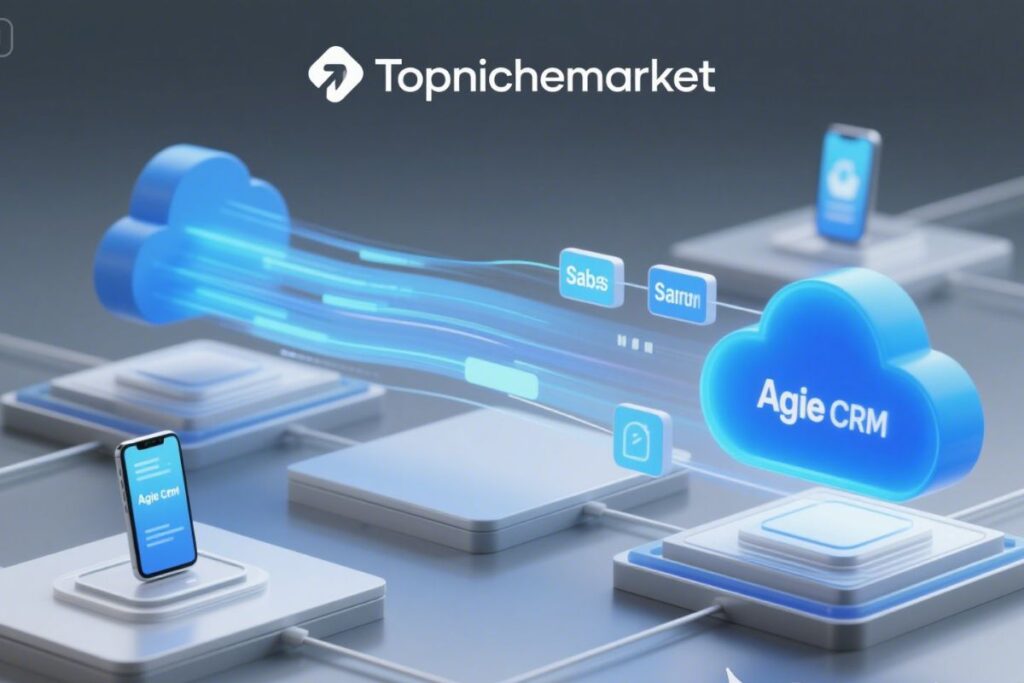
User Reviews & Testimonials What Do 15,000+ Customers Say About Agile CRM
While a structured breakdown of features, along with a balanced list of pros and cons derived from the platform’s description, provides a valuable analytical view, gaining insight into the real-world experiences and sentiment of actual users is absolutely invaluable. Understanding what customers who interact with the software on a daily basis think offers a practical perspective that complements the feature list. The mere fact that Agile CRM is currently trusted and actively used by a large base of over 15,000 customers worldwide is a powerful endorsement in and of itself. This significant user base demonstrates widespread adoption, indicating that a substantial number of businesses have evaluated Agile CRM, chosen to implement it, and continue to derive value from it over time. This is not a platform with just a handful of early adopters or a small user base; it has demonstrably proven its appeal and practical value to a significant number of diverse businesses.
The outline for this review specifically points to summarized user sentiment, highlighting feedback such as finding “definitely the best pricing and features.” This particular testimonial snippet, while brief, is highly telling. It highlights two absolutely key areas where Agile CRM appears to consistently resonate strongly and positively with its existing user base: its competitive and accessible affordability and the comprehensive breadth and practical utility of its feature set. For businesses actively seeking value, which is a primary driver for SMBs, this combination of cost-effectiveness married with robust functionality is evidently a winning formula that satisfies the needs of many among the 15,000+ strong customer base. Finding a single platform that successfully balances compelling affordability with comprehensive, integrated functionality across sales, marketing, and service is a common challenge for businesses, and this user feedback strongly suggests that Agile CRM effectively hits that crucial sweet spot for a large segment of the market.
The mention of resources like a “Wall of Love” or a dedicated Testimonials section within the content provided indicates that Agile CRM actively curates and publicly showcases positive feedback received from its satisfied users. While our analysis here is based solely on the summary provided in the outline, the very existence and promotion of such a section strongly suggest that the company receives a significant volume of positive reviews and customer stories that they feel confident in publicly displaying as social proof of their platform’s value and effectiveness. Prospective users who are interested in learning more about Agile CRM would undoubtedly benefit greatly from actively exploring these public resources. Reading more detailed accounts directly from businesses similar to their own can provide invaluable insights into specific use cases, the tangible successes achieved using the platform, and the day-to-day practical experiences of real users with Agile CRM.
Hearing directly (or through summarized and validated feedback) from such a large and diverse customer base further reinforces the key advantages and strengths of Agile CRM that we have discussed earlier in this review. The sheer scale of adoption by over 15,000 users implies that the platform is not only functionally capable but also provides reliable ongoing support, consistently delivers on its core promises of integration and affordability, and offers a user experience that is sufficiently positive to retain businesses over the long term. Positive feedback specifically focusing on “pricing and features” is particularly encouraging, as these two aspects directly address common pain points and primary decision factors that businesses face when navigating the complex CRM market and selecting a platform. The collective voice and demonstrated trust of over 15,000 satisfied customers serve as a powerful indicator of the tangible benefits and practical effectiveness delivered by Agile CRM in the real world of business operations.
Conclusion: Final Verdict – Is Agile CRM the Right Choice for Your Business in 2025?
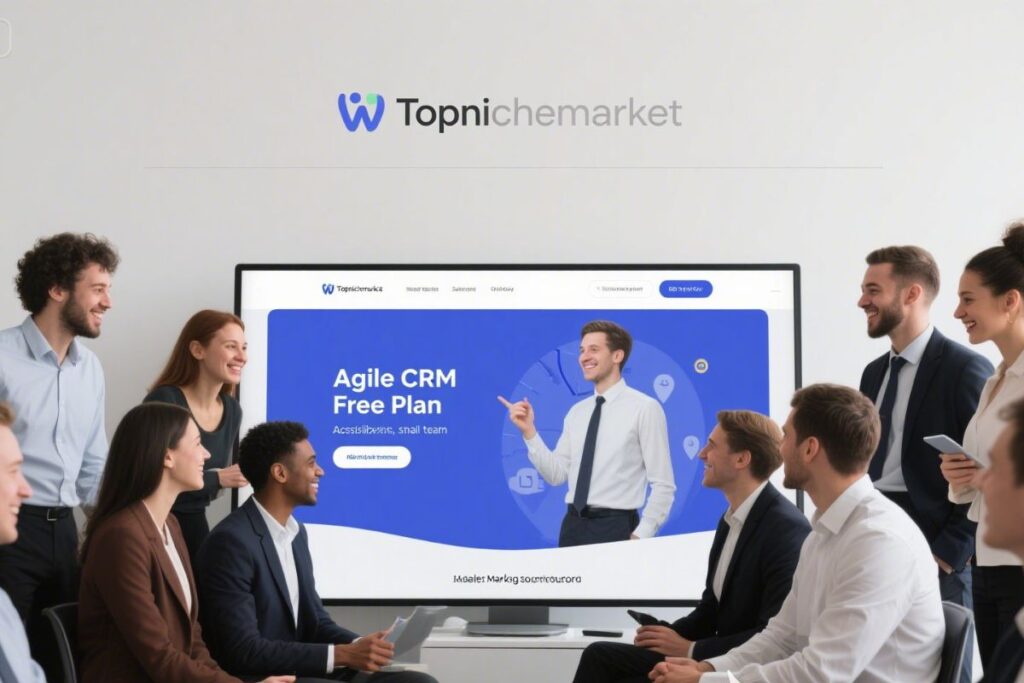
Conclusion Final Verdict – Is Agile CRM the Right Choice for Your Business in 2025
Throughout this comprehensive review, we have meticulously explored the core functionalities, assessed the usability and supporting resources, examined the stated performance and reliability, analyzed the pricing structures and value proposition, and considered the real-world sentiment of the extensive user community surrounding Agile CRM. We have systematically broken down its offerings across sales, marketing, and service, evaluated its claims of simplicity and speed, and highlighted the potential impact of its pricing model, including the attractive free plan and the intriguing connection to the 500apps bundle. Now, it is time to synthesize all of these points and deliver a final, informed verdict on whether Agile CRM effectively lives up to its ambitious promise of being the “Ultimate” all-in-one CRM solution in the context of the 2024 business landscape.
Based on the substantial evidence and details presented and analyzed from the provided outline content, Agile CRM is clearly and convincingly presented as a powerful, feature-rich, and indeed remarkably affordable platform. It successfully delivers on its core premise by integrating critical functionalities for sales force automation, marketing automation, and customer service management into a single, unified, and accessible cloud-based system. The sheer breadth and depth of tools offered within Agile CRM – ranging from detailed contact and deal tracking capabilities to sophisticated marketing automation workflows and email campaigns, alongside an efficient integrated helpdesk and ticketing system – appear to cover the vast majority of essential needs for modern businesses striving to manage customer relationships holistically and effectively across departments.
The notable availability of a genuinely free plan, specifically designed for up to 10 users and explicitly requiring no credit card to get started, is a significant differentiator in the CRM market. This makes Agile CRM exceptionally accessible to startups, very small teams, and businesses operating with limited initial budgets, allowing them to explore powerful capabilities without financial risk. Furthermore, the explicit claim of being “Affordable” for its paid tiers, coupled with the potential access to an incredibly large suite of over 30 other diverse business applications via the associated 500apps bundle at an exceptionally low per-user price point ($14.99), presents a multifaceted value proposition that is genuinely hard to match in the current software market. This compelling combination of comprehensive features and highly aggressive, competitive pricing firmly positions Agile CRM as a compelling and highly attractive option for businesses that are cost-conscious, seeking to consolidate their software vendor relationships, and aiming to gain powerful integrated capabilities without the prohibitive expense often associated with enterprise-level platforms.
The trust demonstrated through widespread adoption by over 15,000 customers and the summarized positive user sentiment, particularly highlighting satisfaction with its “pricing and features,” further validates Agile CRM as a capable, reliable, and valuable solution that is proving its worth in the real world for a large user base. Its foundation as a modern, cloud-based SaaS service ensures ease of accessibility from anywhere, inherent reliability through professional management, and the benefit of receiving regular product updates, which signals a strong commitment to ongoing improvement and keeping the platform current and secure.
So, returning to the central question posed in the title: Is Agile CRM the “Ultimate” all-in-one CRM? While the term “ultimate” can often be subjective and depends heavily on specific, potentially unique business requirements (especially for very large enterprises), Agile CRM certainly makes an exceptionally strong and convincing case, particularly when considering its likely target audience of small to medium-sized businesses and its highly competitive price point. It clearly provides a level of deep integration and a breadth of essential features that are typically found only in much more expensive and complex enterprise-grade CRM platforms. It effectively and directly addresses the common and painful problems of fragmented data, disconnected tools, and operational inefficiencies that many businesses struggle with when attempting to manage sales, marketing, and service using separate systems.
Therefore, based on the thorough analysis presented, Agile CRM is highly likely to be an excellent and strategically sound choice for your business in 2024 if you fit one or more of the following profiles or have these specific needs:
- You are a Small Business or an SMB that is actively searching for a single, integrated solution capable of effectively managing your sales processes, marketing efforts, and customer service interactions without introducing the complexity, integration headaches, and high costs typically associated with purchasing and managing multiple separate software systems from different vendors.
- Your business requires an all-in-one platform specifically to streamline internal workflows across departments, break down data silos, and ensure that all customer-facing teams have access to a unified, single source of truth and a 360-degree view of every customer interaction.
- You are actively seeking an affordable CRM solution that offers significant value for money, especially if your business is small enough to benefit from the incredibly generous free plan (supporting up to 10 users) or if you see significant potential value in the potentially massive software consolidation and cost savings offered by the associated 500apps bundle at its notably low per-user price.
- Your business operates within specific sectors or uses cases where tightly integrated CRM, marketing, and service functions are particularly beneficial for operational efficiency and customer engagement. The outline hinted at industries such as eCommerce companies needing integrated marketing and sales tracking, SaaS companies focused on lead nurturing and customer support, Call Centers requiring unified communication logs, Real Estate agencies managing leads and client communication, or Sales Development Representative (SDR) teams needing streamlined prospecting and follow-up. These industries often benefit greatly from coordinated sales, marketing, and service efforts, which Agile CRM facilitates.
- You prioritize ease of getting started with minimal financial commitment (via the free plan), value a platform that is actively developed with regular feature and security updates, and appreciate access to comprehensive support and learning resources.
Conversely, Agile CRM might be a less ideal fit or may require a more cautious evaluation if:
- You represent a very large, complex enterprise organization with highly unique, deeply specialized, and custom requirements in only one specific functional area (for example, needing the absolute deepest, most customizable, and highly industry-specific enterprise-grade marketing automation platform with no significant current need or desire for tightly integrated sales or service functions), where a hyper-niche tool dedicated solely to that single, specialized function might potentially offer slightly greater depth, customization options, or scalability specifically within that extremely narrow focus area compared to Agile CRM‘s broader integrated approach.
- Your organization has strict, non-negotiable requirements for specific, high-level technical performance benchmarks, detailed uptime guarantees backed by service level agreements (SLAs), or particular security certifications that are not explicitly detailed within the information provided in the source outline for this review. In this case, you would need to obtain this specific information directly from Agile CRM to ensure it meets your compliance and operational needs.
For the vast majority of Small to Medium-sized Businesses seeking a comprehensive, integrated, and cost-effective platform to manage their crucial customer relationships, sales processes, marketing activities, and service delivery, Agile CRM presents a powerful, highly capable, and incredibly affordable solution. Its breadth of features, strong emphasis on integration, user base validation, and compelling value proposition (especially considering the free plan and the 500apps bundle potential) make it a very strong contender and a compelling choice in the competitive 2024 CRM landscape.
Ready to experience firsthand whether Agile CRM is the right fit for your unique business needs and operational requirements? The best and most effective way to truly determine this is to explore the platform yourself and experience its capabilities directly. You can easily discover the core features and evaluate its suitability for your specific workflows without any commitment or financial obligation.
TRY FOR FREE: Discover exactly why over 15,000 diverse businesses trust Agile CRM to manage their customer relationships and drive growth. Sign up effortlessly for the free plan, which fully supports up to 10 users. There is absolutely no credit card required to get started, making it risk-free to explore.
Talk to a Specialist: If your business has specific, detailed questions about how Agile CRM can be precisely tailored, configured, and implemented to address your unique operational challenges, workflow requirements, or industry-specific needs, or if you would benefit from a guided, personalized tour of its features, don’t hesitate to reach out directly to their expert team for dedicated assistance and consultation.
Don’t allow the inefficiencies and limitations of fragmented tools and disconnected data to hinder your business’s potential for growth and customer satisfaction any longer. Take the proactive step to explore the transformative potential of a truly integrated solution like Agile CRM. Unify your sales, marketing, and service efforts onto a single, powerful platform to unlock new levels of operational efficiency, enhance team collaboration, foster stronger customer relationships, and drive sustainable business growth in 2025 and beyond.
“`








